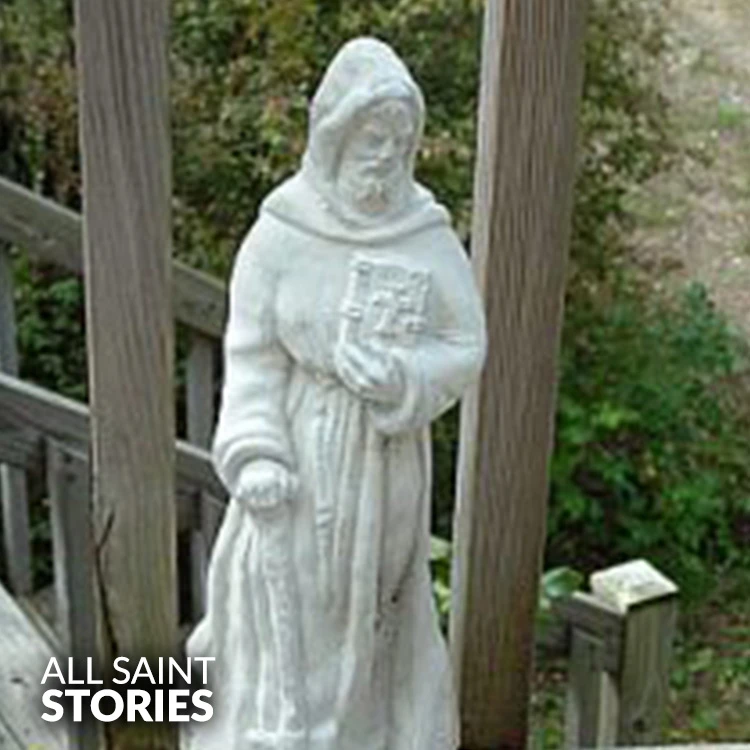Saint Adalard, faithful servant of God and devoted abbot, you dedicated your life to prayer, humility, and the monastic way. Through your example, you showed the value of simplicity and charity. Intercede for us, that we may grow in faith and devotion to God, and may our hearts, like yours, be humble and full of love. Help us to live in peace, work with joy, and serve with kindness, so that we may honor God in all that we do. May your prayers before the throne of God bring us closer to His divine will. Saint Adalard, pray for us. Amen.
ST. ADALARD OF CORBIE
ST. ADALARD OF CORBIE

Saint Adalard of Corbie was a Carolingian noble and monk who played a significant role in the court of Charlemagne before dedicating his life to monastic service. Born in 751 AD in Soissons, France, he was a grandson of Charles Martel and a cousin of Charlemagne. At the age of twenty, he left a promising political career to join the monastery at Corbie, where he later became abbot. He also served as an advisor to Pepin, King of Italy, and later to Emperor Louis the Pious. Despite a period of exile, Adalard was later reinstated and contributed to the foundation of Corvey Abbey in Germany. He passed away on January 2, 826 AD, and is venerated as a saint in the Catholic Church.
Saint Adalard of Corbie was born in 751 AD in Soissons, France, into the powerful Carolingian dynasty. He was the son of Bernard, the son of Charles Martel, making him a cousin of Charlemagne. As a young man, he received an excellent education at the Palatine School in Aachen, the intellectual center of Charlemagne's court. Due to his noble lineage and intelligence, he was appointed Count of the Palace, a high-ranking administrative position within the empire.
Despite his promising career in politics and governance, Adalard chose to dedicate his life to God. At the age of twenty, he entered the Benedictine monastery at Corbie, which had been founded in 662 by Queen Bathild. Seeking deeper solitude and spiritual growth, he later moved to Monte Cassino, the famous monastery founded by Saint Benedict. However, Charlemagne ordered him to return to Corbie, where he was elected abbot. His leadership and wisdom made Corbie one of the most influential monasteries in Europe.
In addition to his monastic duties, Adalard was entrusted with political responsibilities. Charlemagne appointed him as the prime minister to his son, Pepin, King of Italy. During this time, Adalard attended important state meetings and military councils. He was deeply involved in shaping the Carolingian administration, even writing De ordine palatii, a text outlining palace organization and intelligence networks. After Pepin's death in 810, Adalard was assigned as the guardian and tutor of Pepin's son, Bernard of Italy.
In 817, when Bernard rebelled against Emperor Louis the Pious, Adalard was accused of supporting him. As a result, the emperor exiled Adalard to the island of Noirmoutier. After seven years in exile, Louis recognized his mistake and recalled Adalard, making him one of his closest advisors. Upon his return, Adalard resumed his monastic leadership and played a crucial role in founding Corvey Abbey in Westphalia, Germany, in 822. Under his guidance, Corvey became a major center of learning and religious life in the Carolingian Empire.
Adalard was known not only for his administrative and political skills but also for his deep spirituality and acts of charity. He was instrumental in establishing hospitals and other charitable institutions to care for the poor and sick. His devotion to monastic reform helped strengthen the influence of the Benedictine order across Europe.
In late December 825, Adalard fell ill while traveling from Corvey back to Corbie. He passed away on January 2, 826 AD, at the age of seventy-three. Shortly after his death, his disciple Paschasius Radbertus wrote Vitae Adalhardi, a biography that praised Adalard’s wisdom, holiness, and contributions to the Church.
Saint Adalard is honored as the patron saint of several churches and towns in France and along the lower Rhine. His feast day is celebrated on January 2. His legacy continues to inspire monks, scholars, and those devoted to a life of faith and service.
Video Not Found
The information on this website is compiled from various trusted sources. While we aim for accuracy, some details may be incomplete or contain discrepancies.
If you notice any errors or have additional information about this saint, please use the form on the left to share your suggestions. Your input helps us improve and maintain reliable content for everyone.
All submissions are reviewed carefully, and your personal details will remain confidential. Thank you for contributing to the accuracy and value of this resource.
Credits & Acknowledgments
- Anudina Visudhar (Malayalam) – Life of Saints for Everyday
by Msgr. Thomas Moothedan, M.A., D.D. - Saint Companions for Each Day
by A. J. M. Mausolfe & J. K. Mausolfe - US Catholic (Faith in Real Life) – Informational articles
- Wikipedia – General reference content and images
- Anastpaul.com – Saint images and reflections
- Pravachaka Sabdam (Malayalam) – Saint-related content and insights
We sincerely thank these authors and platforms for their valuable contributions. If we have unintentionally missed any attribution, please notify us, and we will make the correction promptly.
If you have any suggestion about ST. ADALARD OF CORBIE
Your suggestion will help improve the information about this saint. Your details will not be disclosed anywhere.
© 2026 Copyright @ www.allsaintstories.com





 English
English
 Italian
Italian
 French
French
 Spanish
Spanish
 Malayalam
Malayalam
 Russian
Russian
 Korean
Korean
 Sinhala
Sinhala
 Japanese
Japanese
 Arabic
Arabic
 Portuguese
Portuguese
 Bantu
Bantu
 Greek
Greek
 German
German
 Dutch
Dutch
 Filipino
Filipino